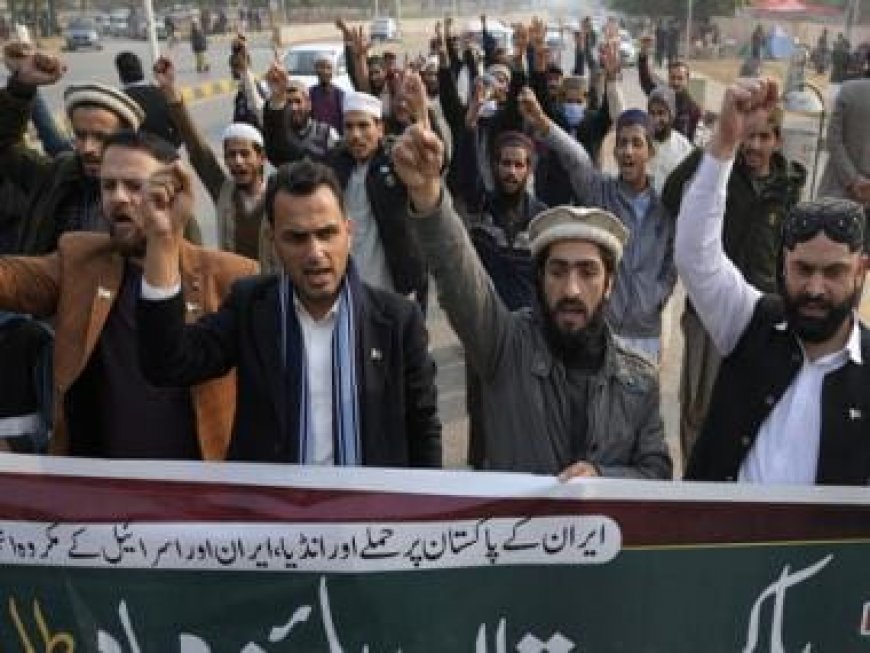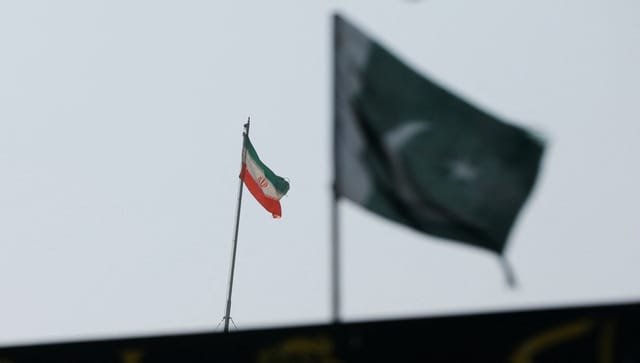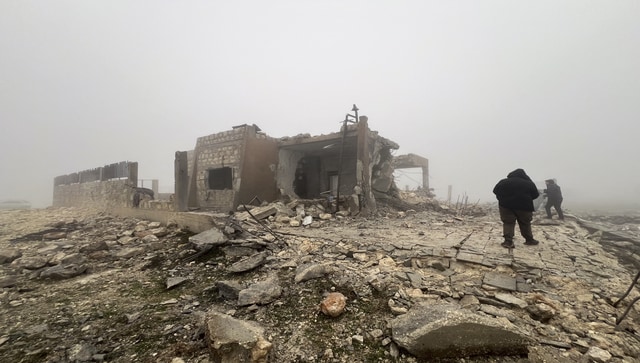Pakistan-Iran tensions: Where do India, the US, China stand?
Pakistan-Iran tensions: Where do India, the US, China stand?

Pakistan’s retaliatory attack in neighbouring Iran has killed at least nine people, including four children. Islamabad said on Thursday (18 January) that it conducted “precision military strikes” against “terrorist hideouts” in southeastern Iran.
These attacks come a day after Iran launched its own strikes on what it called were bases of the militant group Jaish al-Adl in Pakistan’s Balochistan. Islamabad had condemned the strikes, slamming Iran for “unprovoked violation” of its airspace and warning it of “serious consequences”.
These tit-for-tat strikes endanger diplomatic relations between nuclear-armed Pakistan and its neighbour Iran. The latest attacks have also raised concerns about a wider conflict in West Asia, which is already witnessing Israel’s war with Hamas in Gaza.
How have countries reacted to Pakistan and Iran tensions? Let’s take a closer look.
What has Pakistan said?
The Pakistani foreign ministry said it targeted separatist Baloch militants based on “credible intelligence of impending large scale terrorist activities,” reported Associated Press (AP).
“A number of terrorists were killed during the intelligence-based operation,” Pakistan’s foreign ministry claimed, terming it a “series of highly coordinated and specifically targeted precision military strikes against terrorist hideouts”.
“Pakistan fully respects the sovereignty and territorial integrity of the Islamic Republic of Iran,” the ministry’s statement was quoted as saying by Reuters. “The sole objective of today’s act was in pursuit of Pakistan’s own security and national interest, which is paramount and cannot be compromised.”

According to Iranian media, several missiles hit a village in the Sistan-Baluchestan province near the Pakistan border. Ali Reza Marhamati, deputy governor of Iran’s Sistan and Baluchestan province, said three women, four children and two men near the town of Saravan died due to the strikes, reported AP.
Pakistan named its operation “Marg Bar Sarmachar.” While “marg bar” means “death to” in the Persian language, “sarmachar” means fighter in the local Baloch tongue, reported Al Jazeera.
The Pakistani military said its strikes targeted “hideouts used by terrorist organisations namely Balochistan Liberation Army and Balochistan Liberation Front”. Its statement said that “killer drones, rockets, loitering munitions and stand-off weapons” were used to carry out the attack.
“Going forward, dialogue and cooperation is deemed prudent in resolving bilateral issues between the two neighbouring brotherly countries,” the statement read, as per Al Jazeera.
Foreign ministry spokesperson Mumtaz Zahra Baloch said Pakistan’s caretaker Prime Minister Anwaarul-Haq-Kakar would cut short his visit to Switzerland to attend the World Economic Forum in Davos to return home.
Iran’s reaction
Iran strongly rebuked Pakistan’s retaliatory strike inside its territory. The country’s foreign ministry spokesperson, Nasser Kanaani, said Pakistan’s charge d’affaires, its most senior diplomat in Tehran, had been summoned to “offer explanations” for the morning attacks.
Pakistan had already recalled its ambassador from Tehran over Tuesday’s strikes.
Iran’s interior minister confirmed the strikes, telling state media that all nine killed were foreign citizens and that the deadly attack occurred “about 3-4km” inside Iran.
According to Al Jazeera, Pakistan’s strikes on Thursday were the first missile attack on Iranian soil since the end of the Iran-Iraq War in 1988.
Iran’s Islamic Revolutionary Guard Corps (IRGC) has begun military exercises in Iran’s southeast, close to Pakistan, Al Jazeera reported citing state media.
Before Thursday’s attack, Iran’s foreign minister had confirmed striking targets inside Pakistani territory, saying the country’s armed forces hit “terrorist” organisation Jaish al-Adl.
Iran justified its attack, saying it was a response to the militant group’s recent attacks on the Iranian city of Rask in Sistan-Baluchestan.
Speaking on the sidelines of the World Economic Forum in Davos, Iranian foreign minister, Hossein Amir-Abdollahiah, had said that “none of the nationals of the friendly and brotherly country of Pakistan were targeted…”
Not just Pakistan, Iran also launched strikes on Iraq and Syria earlier this week. IRGC hit targets at what it claimed were Israeli “spy headquarters” in Iraq’s Kurdish region and those linked to Islamic State in northern Syria.
Following the attack, Baghdad withdrew its ambassador from Tehran.

India’s stand
India also reacted to the latest tensions between the two countries, stating it was “a matter between Iran and Pakistan”.
However, New Delhi also said that it understands “actions that countries take in their self defence.” The statement had come after Iran’s missile and drone strikes on Pakistani soil.
On Wednesday evening, the Ministry of External Affairs (MEA) said, “This is a matter between Iran and Pakistan. Insofar as India is concerned, we have an uncompromising position of zero tolerance towards terrorism. We understand actions that countries take in their self defence.”
Our response to media queries regarding Iran’s air strikes in Pakistan:https://t.co/45NAxXTpkG pic.twitter.com/1P4Csj5Ftb
— Randhir Jaiswal (@MEAIndia) January 17, 2024
Other countries
The United States, which has taken the lead in attacking Houthi positions in Yemen, denounced Iran for its strikes in Pakistan, Iraq and Syria.
“We condemn those strikes. We’ve seen Iran violate the sovereign borders of three of its neighbours in just the past couple of days,” State Department spokesman Matthew Miller told reporters.
“I think it is a little rich… on one hand Iran (is) the leading funder of terrorism in the region, and, on the other hand, (it claims) it needs to take these actions to counter terrorism,” he added.
The US military said on Wednesday it launched its fourth round of strikes on Houthi targets in less than a week. The Iran-backed rebel group has been attacking ships in the Red Sea since November, saying it was avenging Israel’s attack on Hamas in Gaza.
Meanwhile, China, which is a crucial partner in both nations, has offered to play the role of a mediator to ease tensions between Iran and Pakistan.
“The Chinese side sincerely hopes that the two sides can exercise calm and restraint and avoid an escalation of tension,” foreign ministry spokeswoman Mao Ning told a regular press conference on Thursday.
“We are also willing to play a constructive role in de-escalating the situation if both sides so wish,” she said.
A day back, Beijing had urged both countries to show “restraint”. “We call on both sides to exercise restraint, avoid actions that would lead to an escalation of tension and work together to maintain peace and stability,” the foreign ministry spokeswoman was quoted as saying by AFP.
France’s foreign ministry also criticised Iran for “contributing to the escalation of regional tensions”, adding that “it must stop.”
Will tensions between Iran and Pakistan escalate?
Experts believe there could be a wider escalation between the two neighbours.
“Iran’s motivation for attacking Pakistan remains opaque but in light of broader Iranian behaviour in the region it can escalate,” Asfandyr Mir, a senior expert on South Asia security at the US Institute of Peace, told Reuters.
“What will cause anxiety in Tehran is that Pakistan has crossed a line by hitting inside Iranian territory, a threshold that even the US and Israel have been careful to not breach.”
Baqir Sajjad Syed, a Pakistan fellow at the Washington, DC-based organisation, the Wilson Center, warned of a possible revival of militancy in Iran and Pakistan.
“I doubt that this will end with Pakistan’s retaliation. The mistrust that earlier prevented action against armed groups on both sides of the border would grow. As a result of which I foresee a resurgence of militancy on both sides,” he told Al Jazeera.
With inputs from agencies
What's Your Reaction?



























































